Analysis of the Turkish Economic Crisis in 2018: Causes and Effects
VerifiedAdded on 2022/08/29
|8
|1588
|24
Report
AI Summary
This report provides a detailed analysis of the economic crisis that struck Turkey in 2018. It identifies the primary causes as a current account deficit, a decline in the export sector, and a decrease in foreign reserves. The crisis led to stagflation within Turkey's economy, while the global economy experienced a slowdown due to reduced bank lending. The Turkish government implemented various policies to mitigate the crisis, though the risk of a recession persists. The report examines the effects on the economy of Turkey and the global economy, analyzes the government's responses, and concludes with an assessment of the current economic challenges faced by Turkey. The study uses data from the World Bank and other sources to support its findings and includes a discussion of the impact of tariffs and debt on the economic downturn.
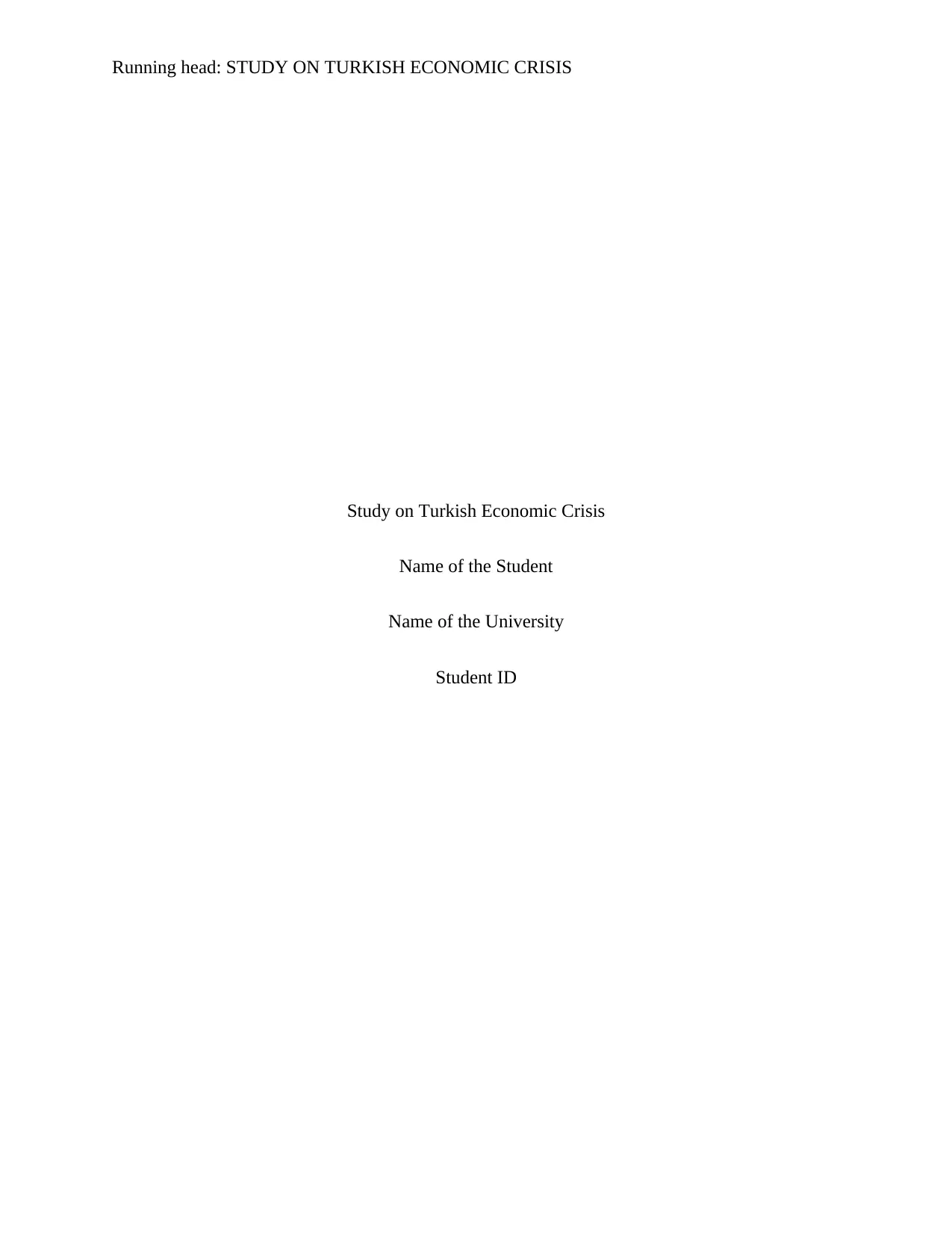
Running head: STUDY ON TURKISH ECONOMIC CRISIS
Study on Turkish Economic Crisis
Name of the Student
Name of the University
Student ID
Study on Turkish Economic Crisis
Name of the Student
Name of the University
Student ID
Paraphrase This Document
Need a fresh take? Get an instant paraphrase of this document with our AI Paraphraser
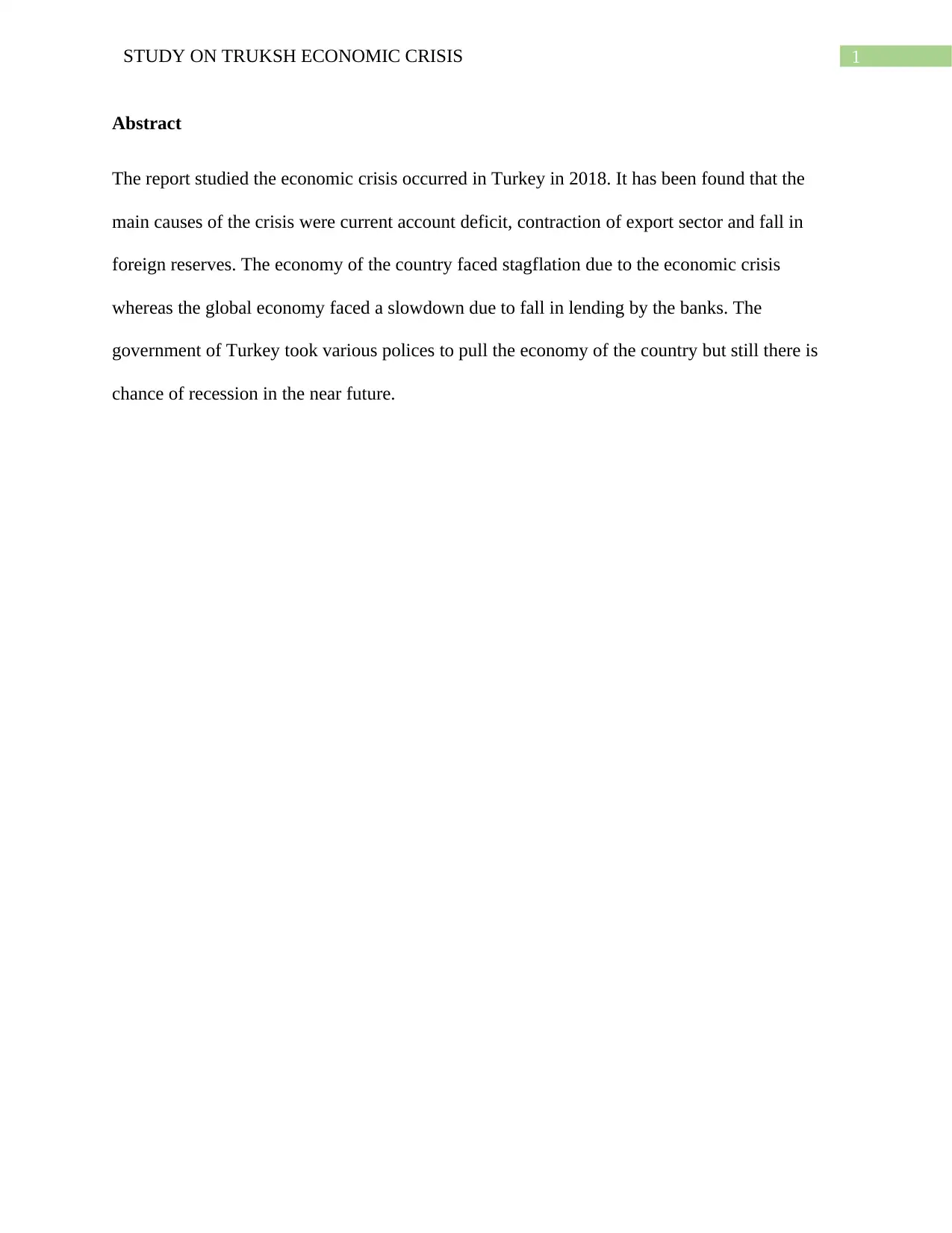
1STUDY ON TRUKSH ECONOMIC CRISIS
Abstract
The report studied the economic crisis occurred in Turkey in 2018. It has been found that the
main causes of the crisis were current account deficit, contraction of export sector and fall in
foreign reserves. The economy of the country faced stagflation due to the economic crisis
whereas the global economy faced a slowdown due to fall in lending by the banks. The
government of Turkey took various polices to pull the economy of the country but still there is
chance of recession in the near future.
Abstract
The report studied the economic crisis occurred in Turkey in 2018. It has been found that the
main causes of the crisis were current account deficit, contraction of export sector and fall in
foreign reserves. The economy of the country faced stagflation due to the economic crisis
whereas the global economy faced a slowdown due to fall in lending by the banks. The
government of Turkey took various polices to pull the economy of the country but still there is
chance of recession in the near future.
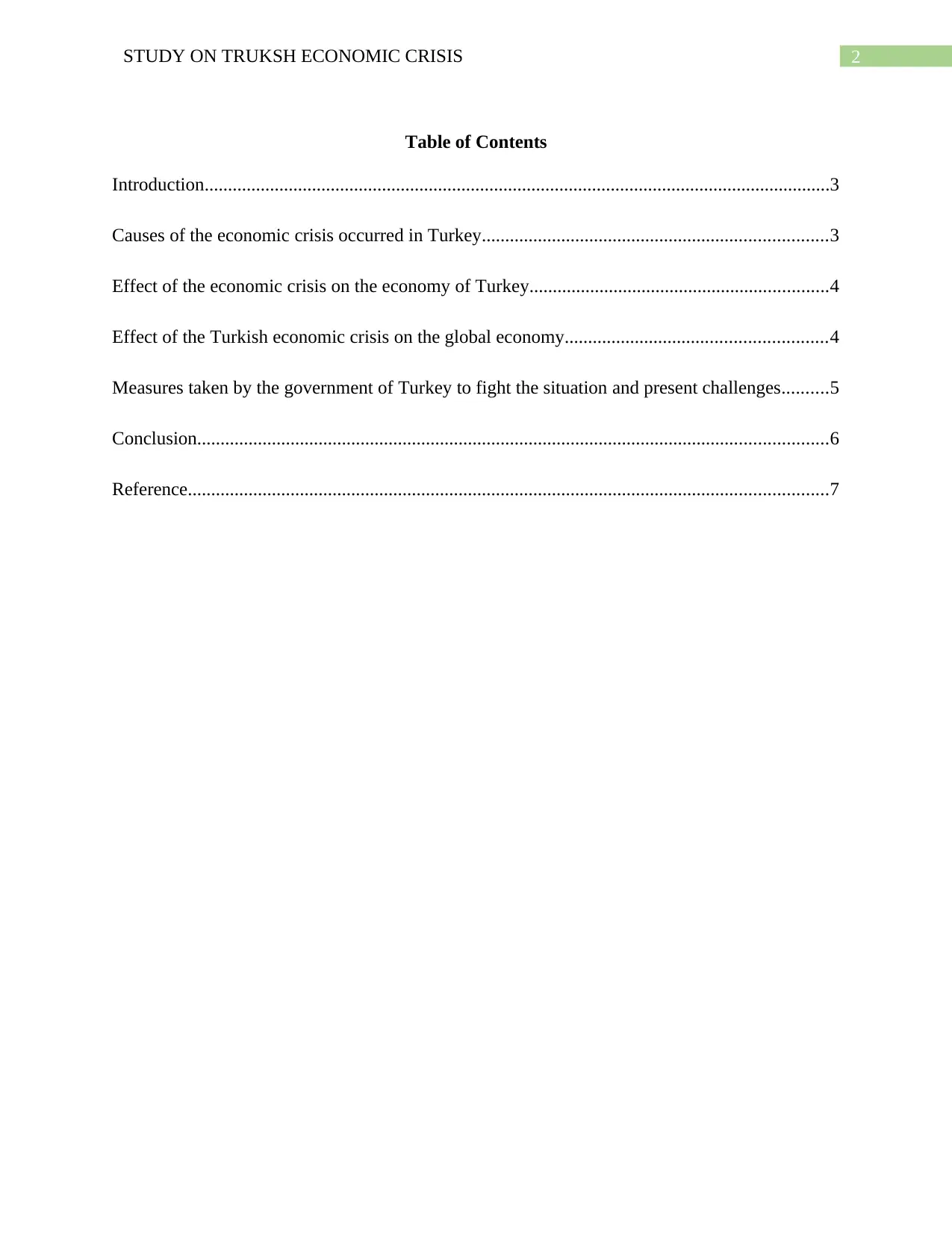
2STUDY ON TRUKSH ECONOMIC CRISIS
Table of Contents
Introduction......................................................................................................................................3
Causes of the economic crisis occurred in Turkey..........................................................................3
Effect of the economic crisis on the economy of Turkey................................................................4
Effect of the Turkish economic crisis on the global economy........................................................4
Measures taken by the government of Turkey to fight the situation and present challenges..........5
Conclusion.......................................................................................................................................6
Reference.........................................................................................................................................7
Table of Contents
Introduction......................................................................................................................................3
Causes of the economic crisis occurred in Turkey..........................................................................3
Effect of the economic crisis on the economy of Turkey................................................................4
Effect of the Turkish economic crisis on the global economy........................................................4
Measures taken by the government of Turkey to fight the situation and present challenges..........5
Conclusion.......................................................................................................................................6
Reference.........................................................................................................................................7
⊘ This is a preview!⊘
Do you want full access?
Subscribe today to unlock all pages.

Trusted by 1+ million students worldwide
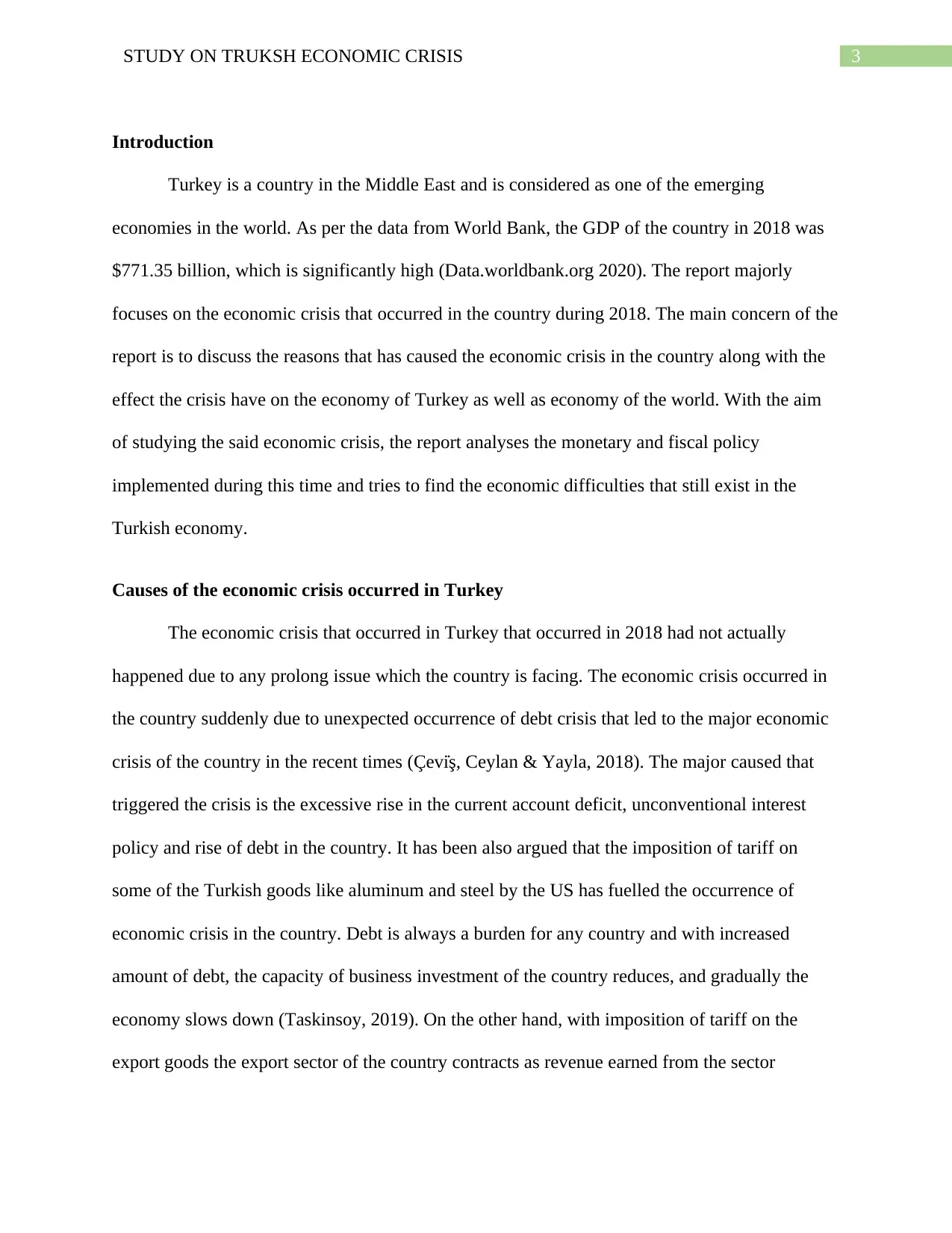
3STUDY ON TRUKSH ECONOMIC CRISIS
Introduction
Turkey is a country in the Middle East and is considered as one of the emerging
economies in the world. As per the data from World Bank, the GDP of the country in 2018 was
$771.35 billion, which is significantly high (Data.worldbank.org 2020). The report majorly
focuses on the economic crisis that occurred in the country during 2018. The main concern of the
report is to discuss the reasons that has caused the economic crisis in the country along with the
effect the crisis have on the economy of Turkey as well as economy of the world. With the aim
of studying the said economic crisis, the report analyses the monetary and fiscal policy
implemented during this time and tries to find the economic difficulties that still exist in the
Turkish economy.
Causes of the economic crisis occurred in Turkey
The economic crisis that occurred in Turkey that occurred in 2018 had not actually
happened due to any prolong issue which the country is facing. The economic crisis occurred in
the country suddenly due to unexpected occurrence of debt crisis that led to the major economic
crisis of the country in the recent times (Çevi̇ş, Ceylan & Yayla, 2018). The major caused that
triggered the crisis is the excessive rise in the current account deficit, unconventional interest
policy and rise of debt in the country. It has been also argued that the imposition of tariff on
some of the Turkish goods like aluminum and steel by the US has fuelled the occurrence of
economic crisis in the country. Debt is always a burden for any country and with increased
amount of debt, the capacity of business investment of the country reduces, and gradually the
economy slows down (Taskinsoy, 2019). On the other hand, with imposition of tariff on the
export goods the export sector of the country contracts as revenue earned from the sector
Introduction
Turkey is a country in the Middle East and is considered as one of the emerging
economies in the world. As per the data from World Bank, the GDP of the country in 2018 was
$771.35 billion, which is significantly high (Data.worldbank.org 2020). The report majorly
focuses on the economic crisis that occurred in the country during 2018. The main concern of the
report is to discuss the reasons that has caused the economic crisis in the country along with the
effect the crisis have on the economy of Turkey as well as economy of the world. With the aim
of studying the said economic crisis, the report analyses the monetary and fiscal policy
implemented during this time and tries to find the economic difficulties that still exist in the
Turkish economy.
Causes of the economic crisis occurred in Turkey
The economic crisis that occurred in Turkey that occurred in 2018 had not actually
happened due to any prolong issue which the country is facing. The economic crisis occurred in
the country suddenly due to unexpected occurrence of debt crisis that led to the major economic
crisis of the country in the recent times (Çevi̇ş, Ceylan & Yayla, 2018). The major caused that
triggered the crisis is the excessive rise in the current account deficit, unconventional interest
policy and rise of debt in the country. It has been also argued that the imposition of tariff on
some of the Turkish goods like aluminum and steel by the US has fuelled the occurrence of
economic crisis in the country. Debt is always a burden for any country and with increased
amount of debt, the capacity of business investment of the country reduces, and gradually the
economy slows down (Taskinsoy, 2019). On the other hand, with imposition of tariff on the
export goods the export sector of the country contracts as revenue earned from the sector
Paraphrase This Document
Need a fresh take? Get an instant paraphrase of this document with our AI Paraphraser
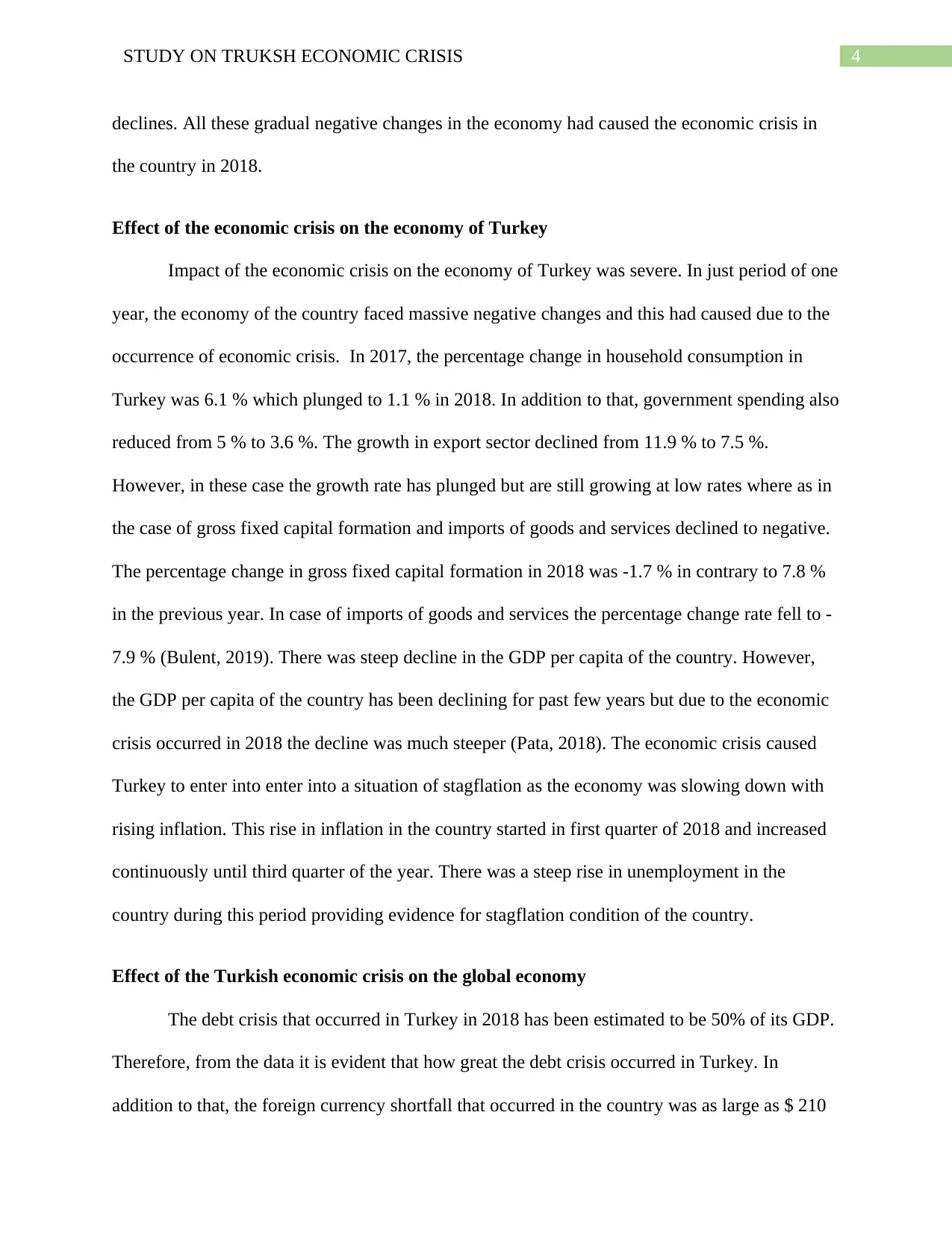
4STUDY ON TRUKSH ECONOMIC CRISIS
declines. All these gradual negative changes in the economy had caused the economic crisis in
the country in 2018.
Effect of the economic crisis on the economy of Turkey
Impact of the economic crisis on the economy of Turkey was severe. In just period of one
year, the economy of the country faced massive negative changes and this had caused due to the
occurrence of economic crisis. In 2017, the percentage change in household consumption in
Turkey was 6.1 % which plunged to 1.1 % in 2018. In addition to that, government spending also
reduced from 5 % to 3.6 %. The growth in export sector declined from 11.9 % to 7.5 %.
However, in these case the growth rate has plunged but are still growing at low rates where as in
the case of gross fixed capital formation and imports of goods and services declined to negative.
The percentage change in gross fixed capital formation in 2018 was -1.7 % in contrary to 7.8 %
in the previous year. In case of imports of goods and services the percentage change rate fell to -
7.9 % (Bulent, 2019). There was steep decline in the GDP per capita of the country. However,
the GDP per capita of the country has been declining for past few years but due to the economic
crisis occurred in 2018 the decline was much steeper (Pata, 2018). The economic crisis caused
Turkey to enter into enter into a situation of stagflation as the economy was slowing down with
rising inflation. This rise in inflation in the country started in first quarter of 2018 and increased
continuously until third quarter of the year. There was a steep rise in unemployment in the
country during this period providing evidence for stagflation condition of the country.
Effect of the Turkish economic crisis on the global economy
The debt crisis that occurred in Turkey in 2018 has been estimated to be 50% of its GDP.
Therefore, from the data it is evident that how great the debt crisis occurred in Turkey. In
addition to that, the foreign currency shortfall that occurred in the country was as large as $ 210
declines. All these gradual negative changes in the economy had caused the economic crisis in
the country in 2018.
Effect of the economic crisis on the economy of Turkey
Impact of the economic crisis on the economy of Turkey was severe. In just period of one
year, the economy of the country faced massive negative changes and this had caused due to the
occurrence of economic crisis. In 2017, the percentage change in household consumption in
Turkey was 6.1 % which plunged to 1.1 % in 2018. In addition to that, government spending also
reduced from 5 % to 3.6 %. The growth in export sector declined from 11.9 % to 7.5 %.
However, in these case the growth rate has plunged but are still growing at low rates where as in
the case of gross fixed capital formation and imports of goods and services declined to negative.
The percentage change in gross fixed capital formation in 2018 was -1.7 % in contrary to 7.8 %
in the previous year. In case of imports of goods and services the percentage change rate fell to -
7.9 % (Bulent, 2019). There was steep decline in the GDP per capita of the country. However,
the GDP per capita of the country has been declining for past few years but due to the economic
crisis occurred in 2018 the decline was much steeper (Pata, 2018). The economic crisis caused
Turkey to enter into enter into a situation of stagflation as the economy was slowing down with
rising inflation. This rise in inflation in the country started in first quarter of 2018 and increased
continuously until third quarter of the year. There was a steep rise in unemployment in the
country during this period providing evidence for stagflation condition of the country.
Effect of the Turkish economic crisis on the global economy
The debt crisis that occurred in Turkey in 2018 has been estimated to be 50% of its GDP.
Therefore, from the data it is evident that how great the debt crisis occurred in Turkey. In
addition to that, the foreign currency shortfall that occurred in the country was as large as $ 210
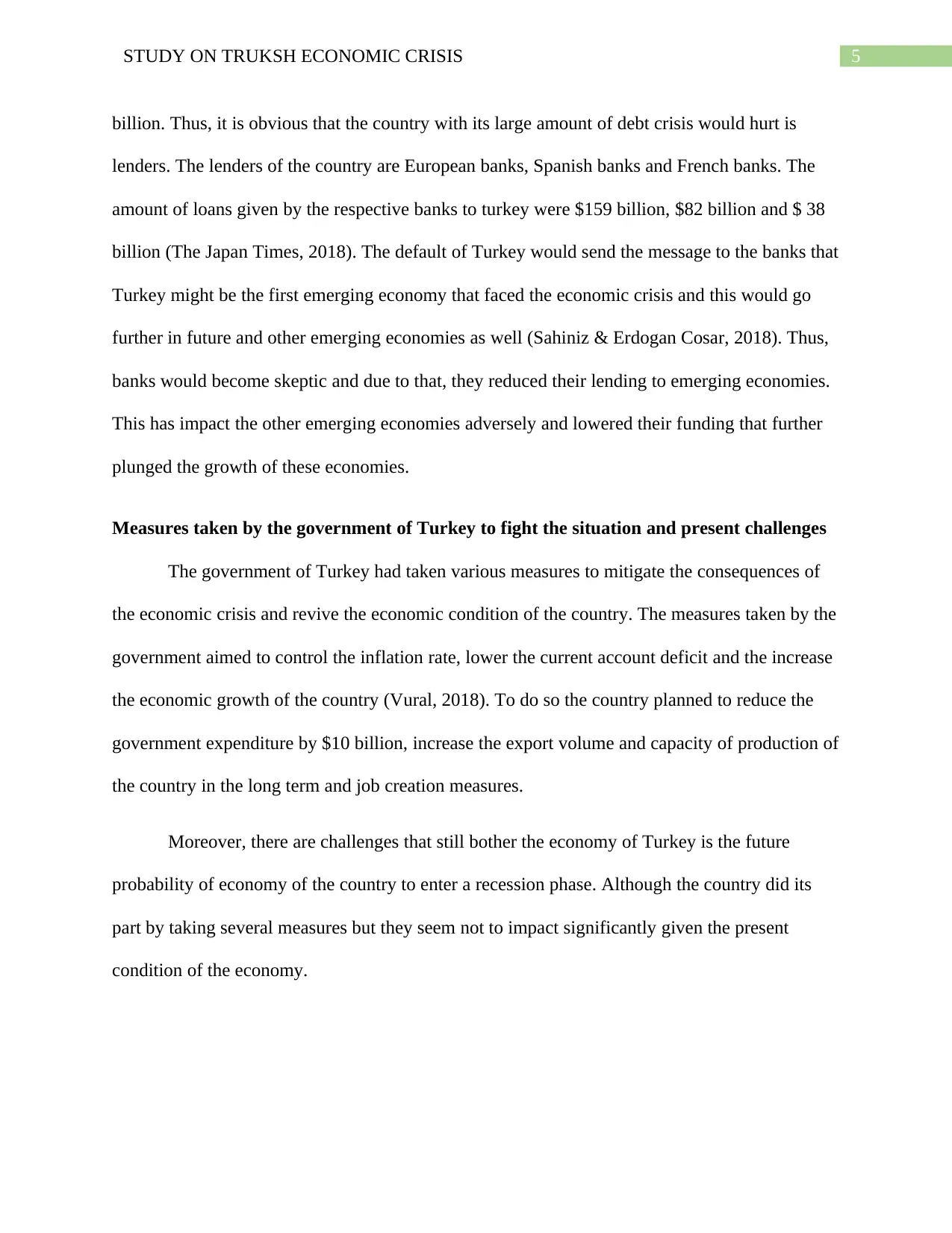
5STUDY ON TRUKSH ECONOMIC CRISIS
billion. Thus, it is obvious that the country with its large amount of debt crisis would hurt is
lenders. The lenders of the country are European banks, Spanish banks and French banks. The
amount of loans given by the respective banks to turkey were $159 billion, $82 billion and $ 38
billion (The Japan Times, 2018). The default of Turkey would send the message to the banks that
Turkey might be the first emerging economy that faced the economic crisis and this would go
further in future and other emerging economies as well (Sahiniz & Erdogan Cosar, 2018). Thus,
banks would become skeptic and due to that, they reduced their lending to emerging economies.
This has impact the other emerging economies adversely and lowered their funding that further
plunged the growth of these economies.
Measures taken by the government of Turkey to fight the situation and present challenges
The government of Turkey had taken various measures to mitigate the consequences of
the economic crisis and revive the economic condition of the country. The measures taken by the
government aimed to control the inflation rate, lower the current account deficit and the increase
the economic growth of the country (Vural, 2018). To do so the country planned to reduce the
government expenditure by $10 billion, increase the export volume and capacity of production of
the country in the long term and job creation measures.
Moreover, there are challenges that still bother the economy of Turkey is the future
probability of economy of the country to enter a recession phase. Although the country did its
part by taking several measures but they seem not to impact significantly given the present
condition of the economy.
billion. Thus, it is obvious that the country with its large amount of debt crisis would hurt is
lenders. The lenders of the country are European banks, Spanish banks and French banks. The
amount of loans given by the respective banks to turkey were $159 billion, $82 billion and $ 38
billion (The Japan Times, 2018). The default of Turkey would send the message to the banks that
Turkey might be the first emerging economy that faced the economic crisis and this would go
further in future and other emerging economies as well (Sahiniz & Erdogan Cosar, 2018). Thus,
banks would become skeptic and due to that, they reduced their lending to emerging economies.
This has impact the other emerging economies adversely and lowered their funding that further
plunged the growth of these economies.
Measures taken by the government of Turkey to fight the situation and present challenges
The government of Turkey had taken various measures to mitigate the consequences of
the economic crisis and revive the economic condition of the country. The measures taken by the
government aimed to control the inflation rate, lower the current account deficit and the increase
the economic growth of the country (Vural, 2018). To do so the country planned to reduce the
government expenditure by $10 billion, increase the export volume and capacity of production of
the country in the long term and job creation measures.
Moreover, there are challenges that still bother the economy of Turkey is the future
probability of economy of the country to enter a recession phase. Although the country did its
part by taking several measures but they seem not to impact significantly given the present
condition of the economy.
⊘ This is a preview!⊘
Do you want full access?
Subscribe today to unlock all pages.

Trusted by 1+ million students worldwide
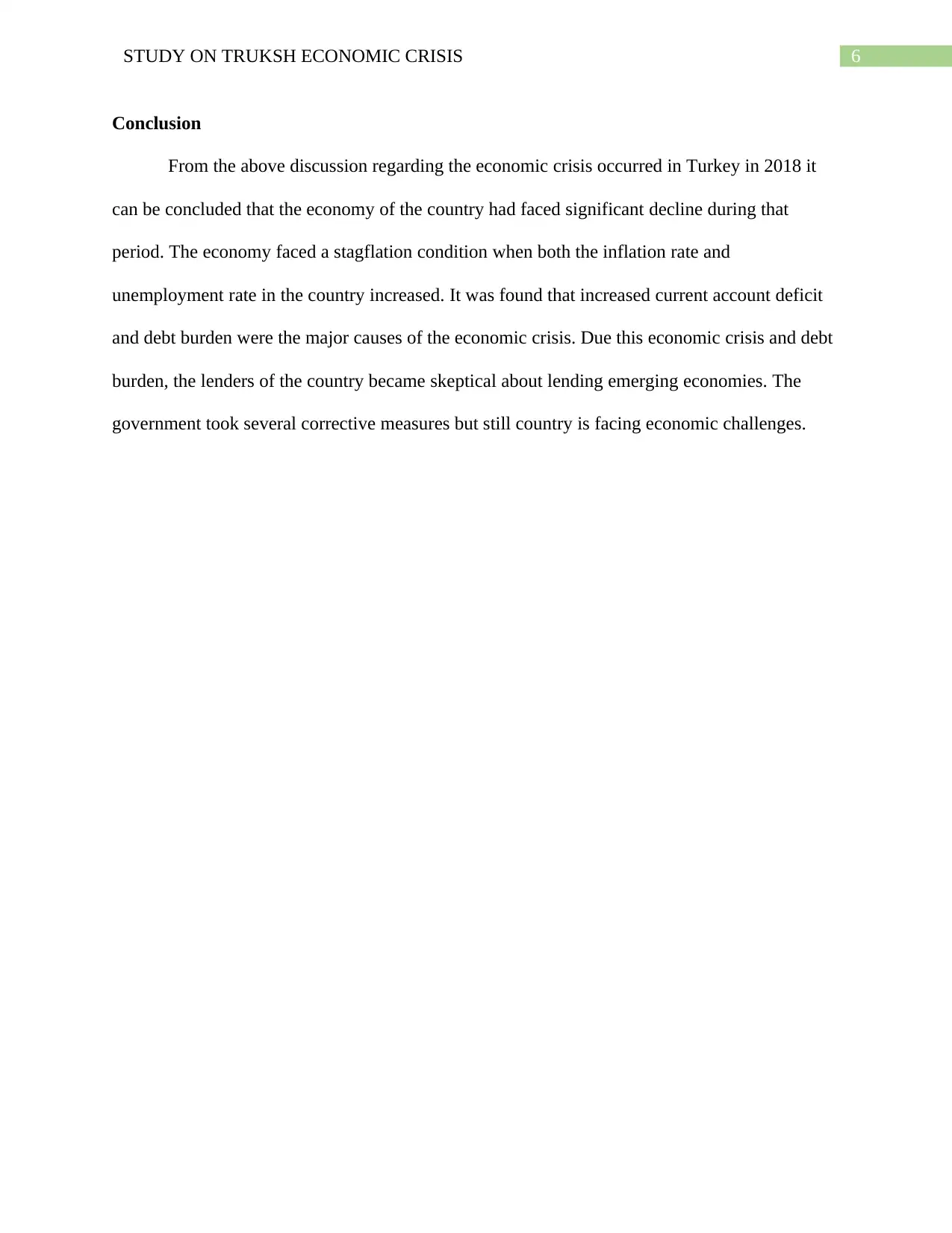
6STUDY ON TRUKSH ECONOMIC CRISIS
Conclusion
From the above discussion regarding the economic crisis occurred in Turkey in 2018 it
can be concluded that the economy of the country had faced significant decline during that
period. The economy faced a stagflation condition when both the inflation rate and
unemployment rate in the country increased. It was found that increased current account deficit
and debt burden were the major causes of the economic crisis. Due this economic crisis and debt
burden, the lenders of the country became skeptical about lending emerging economies. The
government took several corrective measures but still country is facing economic challenges.
Conclusion
From the above discussion regarding the economic crisis occurred in Turkey in 2018 it
can be concluded that the economy of the country had faced significant decline during that
period. The economy faced a stagflation condition when both the inflation rate and
unemployment rate in the country increased. It was found that increased current account deficit
and debt burden were the major causes of the economic crisis. Due this economic crisis and debt
burden, the lenders of the country became skeptical about lending emerging economies. The
government took several corrective measures but still country is facing economic challenges.
Paraphrase This Document
Need a fresh take? Get an instant paraphrase of this document with our AI Paraphraser
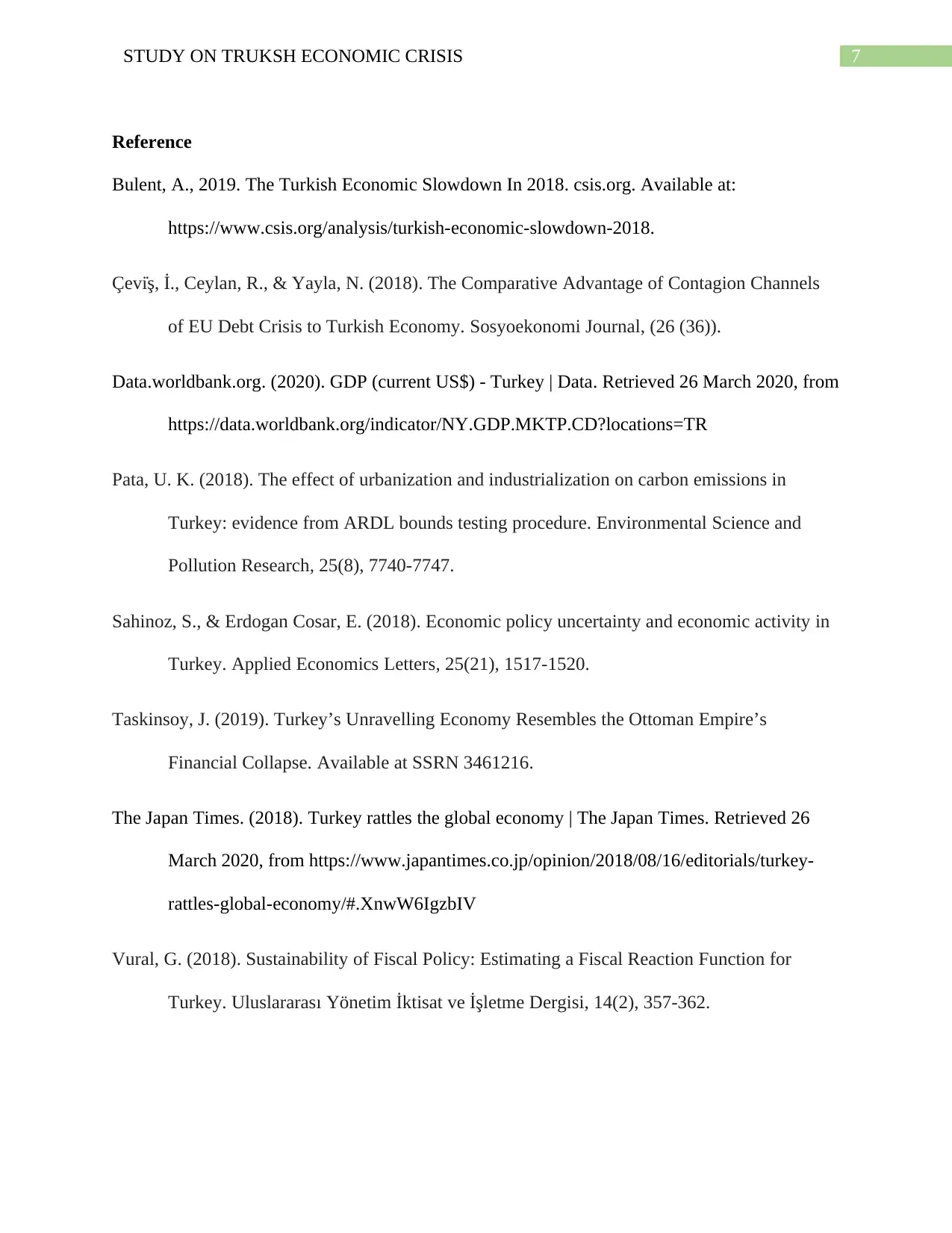
7STUDY ON TRUKSH ECONOMIC CRISIS
Reference
Bulent, A., 2019. The Turkish Economic Slowdown In 2018. csis.org. Available at:
https://www.csis.org/analysis/turkish-economic-slowdown-2018.
Çevi̇ş, İ., Ceylan, R., & Yayla, N. (2018). The Comparative Advantage of Contagion Channels
of EU Debt Crisis to Turkish Economy. Sosyoekonomi Journal, (26 (36)).
Data.worldbank.org. (2020). GDP (current US$) - Turkey | Data. Retrieved 26 March 2020, from
https://data.worldbank.org/indicator/NY.GDP.MKTP.CD?locations=TR
Pata, U. K. (2018). The effect of urbanization and industrialization on carbon emissions in
Turkey: evidence from ARDL bounds testing procedure. Environmental Science and
Pollution Research, 25(8), 7740-7747.
Sahinoz, S., & Erdogan Cosar, E. (2018). Economic policy uncertainty and economic activity in
Turkey. Applied Economics Letters, 25(21), 1517-1520.
Taskinsoy, J. (2019). Turkey’s Unravelling Economy Resembles the Ottoman Empire’s
Financial Collapse. Available at SSRN 3461216.
The Japan Times. (2018). Turkey rattles the global economy | The Japan Times. Retrieved 26
March 2020, from https://www.japantimes.co.jp/opinion/2018/08/16/editorials/turkey-
rattles-global-economy/#.XnwW6IgzbIV
Vural, G. (2018). Sustainability of Fiscal Policy: Estimating a Fiscal Reaction Function for
Turkey. Uluslararası Yönetim İktisat ve İşletme Dergisi, 14(2), 357-362.
Reference
Bulent, A., 2019. The Turkish Economic Slowdown In 2018. csis.org. Available at:
https://www.csis.org/analysis/turkish-economic-slowdown-2018.
Çevi̇ş, İ., Ceylan, R., & Yayla, N. (2018). The Comparative Advantage of Contagion Channels
of EU Debt Crisis to Turkish Economy. Sosyoekonomi Journal, (26 (36)).
Data.worldbank.org. (2020). GDP (current US$) - Turkey | Data. Retrieved 26 March 2020, from
https://data.worldbank.org/indicator/NY.GDP.MKTP.CD?locations=TR
Pata, U. K. (2018). The effect of urbanization and industrialization on carbon emissions in
Turkey: evidence from ARDL bounds testing procedure. Environmental Science and
Pollution Research, 25(8), 7740-7747.
Sahinoz, S., & Erdogan Cosar, E. (2018). Economic policy uncertainty and economic activity in
Turkey. Applied Economics Letters, 25(21), 1517-1520.
Taskinsoy, J. (2019). Turkey’s Unravelling Economy Resembles the Ottoman Empire’s
Financial Collapse. Available at SSRN 3461216.
The Japan Times. (2018). Turkey rattles the global economy | The Japan Times. Retrieved 26
March 2020, from https://www.japantimes.co.jp/opinion/2018/08/16/editorials/turkey-
rattles-global-economy/#.XnwW6IgzbIV
Vural, G. (2018). Sustainability of Fiscal Policy: Estimating a Fiscal Reaction Function for
Turkey. Uluslararası Yönetim İktisat ve İşletme Dergisi, 14(2), 357-362.
1 out of 8
Related Documents
Your All-in-One AI-Powered Toolkit for Academic Success.
+13062052269
info@desklib.com
Available 24*7 on WhatsApp / Email
![[object Object]](/_next/static/media/star-bottom.7253800d.svg)
Unlock your academic potential
Copyright © 2020–2026 A2Z Services. All Rights Reserved. Developed and managed by ZUCOL.





